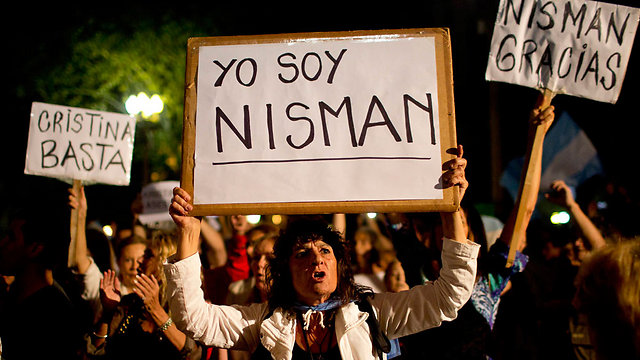
Argentine president seeks overhaul of intelligence services
President Cristina Fernandez calls on Congress to dissolve SI after her gov't suggested 'rogue intelligence agents' may have orchestrated AMIA prosecutor's death.
BUENOS AIRES - President Cristina Fernandez called on Congress on Monday to dissolve Argentina's intelligence services in the wake of the mysterious death of a prosecutor, strongly denying his accusation that she had sought to shield former Iranian officials suspected in the 1994 bombing of a Jewish center.
In a nationally televised address, her first since the death of prosecutor Alberto Nisman hours before he was to give potentially explosive testimony on the alleged cover up, Fernandez said her proposal to create a new spy agency would be presented to lawmakers by the end of the week.
She did not say who might have killed Nisman, but in recent letters posted on social media she had suggested that rogue intelligence agents may have orchestrated the death in a plot against her government. In the speech, she provided no new details of the alleged plot and Fernandez herself oversees the intelligence agencies in question.
She said reforming the clandestine services was a "national debt" the country has had since the return of democracy in 1983. Argentina had several years of a brutal dictatorship, and Fernandez suggested that the problems of today had their roots in the years of that military government.
The SI, formerly known as the SIDE, has significant power and autonomy. In the "dirty war" directed by Argentina's military dictatorship of 1976-83, the agency spied on Marxist rebels, labor unions and other leftists.
While government officials had previously labeled Nisman's allegations as absurd, Monday's speech was the first time Fernandez had taken them on directly.
"It's unreasonable to think our government could even be suspected of such a maneuver," said Fernandez, who spoke while sitting in a wheelchair because of a fractured ankle.
Nisman, 51, was found dead Jan. 18 in the bathroom in his apartment, a bullet in his right temple. A .22 caliber gun was found next to him. His death came days after he gave a judge a report alleging Fernandez secretly reached a deal to prevent prosecution of former Iranian officials accused of involvement in the 1994 bombing of Argentina's largest Jewish center, which killed 85 people. She allegedly reached the deal in exchange for economic and trade benefits with Iran.
Iran has denied the accusation.
Nisman's death has produced anti-government protests and a myriad of conspiracy theories, ranging from suicide to the involvement of Iranian intelligence agents.
Appearing rested and calm, Fernandez began with a spirited defense of all her government had done to try to solve the 1994 case.
She lamented that more than 20 years later nobody had been convicted or even detained. She noted that her predecessor, husband and former President Nestor Kirchner, had appointed Nisman to the case after years of paralysis.
She said a 2013 memorandum of understanding with Iran, which many in the country have bitterly criticized, was aimed at obtaining cooperation with the Middle Eastern powerhouse to finally seek justice for the bombing.
Fernandez, 61, said the new "Federal Intelligence Agency" would have a director and deputy, and only a few in government would have access to the agency heads, apparently a critique of a system where many in Congress have contact with intelligence officials.
In her two letters the last week, Fernandez suggested Nisman's death was a plot against her government possibly orchestrated by intelligence services, which had fed false information to Nisman.
In her first letter, published Jan. 19, she suggested that Nisman committed suicide. Three days later, however, she did an about-face, suggesting that he had been killed.
Argentina's political opposition criticized Fernandez's latest comments.
Before there are any reforms to the intelligence services, the government "should explain the 11 years it has managed" them, opposition lawmaker Margarita Stolbizer told Todo Noticias.
"The speech was filled with imprecise (statements) and lies," Stolbizer said. "She did not give answers to the doubts about this government nor about the content of Nisman's denouncement."
Employing the fiery rhetoric she is known for, at the end her televised speech, Fernandez said she had a message for her countrymen.
"I will not be extorted, I am not afraid" of being cited by judges or denounced by investigators, she said. "They will not make me move even a centimeter from what I have always thought."
Reuters contributed to this report.












